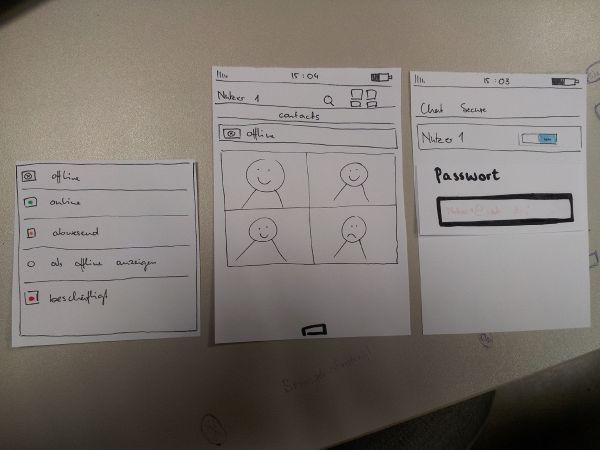Aims of data gathering
During the course "Nutzerstudien" we wanted to know how important security is for students at our age, what they expect from chat apps and what their problems/whishes are. Main focus was also the question of authenticity.
For that reason we started to interview a few people from our social environment.
Data gathering: Interviews/Observation
1. Interviews:
Interview partner:
| Number | Age class | Course of studies |
|---|---|---|
| 1 | <20 | Arts |
| 2 | <20 | Arts |
| 3 | 20-25 | Science/Engineering |
| 4 | 25-30 | Science/Engineering |
| 5 | <20 | Fine Arts/Design |
| 6 | <20 | Fine Arts/Design |
| 7 | <20 | Fine Arts/Design |
Reasons for choosing these people: [...]
Central questions:
- What chat apps/programs do you use and for what purposes (one-on-one interviews or group discussions, image, video and link transfer)?
- Where do you see advantages and disadvantages of your favorite chat program?
- How important authentication is for you?
- How should a trustable profile be? What information are important?
- In what situations you prefer the phone or an E-Mail before chatting?
- What are requirements for you to use a new app with guaranteed security?
- How often do you use them and how important they are for you?
- How important is security for you while chatting with people?
- What measures do you probably adopt to be safe?
- What functions and design features do you find most important for a chat app?
2. Observation:
[2nd Interview Round ...]
Data Analysis & Main Results
- The user wants an interface, where you can see who is online at the moment and when a contact was online the last time.
- The user wants to know if the chat partner read the messages.
- The user wants a simple, intuitive, neatly arranged design, which looks uniform on all gadgets.
- If you want a trustworthy profile you have to find a good balance between too much and too little information.
- (To much) Personalized advertising makes the user feel insecure.
- A “real” profile picture is soothing for the user.
- It would be useful to have a password for the app.
- The user wants to send out photos/videos.
- The user wants to use a lot of smileys.
- The function "writes..." is not necassary.
- The user wants to use an app/program which is used by a lot of people.
- The app should be for free.
- The user wants to have a security warranty.
- Authenticity doesn't loom large for students personally.
- It is important that apps are immune from viruses.
- It’s more comfortably to chat than to phone with somebody.
- For the user it’s important to be up-to-date and flexible with messages. So he/she prefers an app for chatting.
- Because of misunderstandings in chat, some users prefer a phone call for personal discussions.
- Some other users prefer the phone because think the chat-partner reads the message too late.
- Important information, link, photos, videos, … are often sent by E-Mail.
- Distrust towards apps results e.g. from missing knowledge about safety and smart phone-apps.
- People use safety-options of social networks (e.g. Facebook) but don’t know, if they really work.
What specifc problem we want to solve
We want to solve some problems with the login-process and make it easier to use. It's hard and circular to login with one of your accounts, because there are too many steps until you are finally logged in. Moreover the buttons are difficult to find on the interface. Therefore we want to create a new login-process.
Plans – how we want to solve the problem(s)
Our first prototype for the login process.
